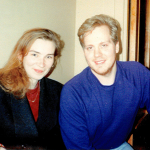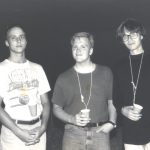On October 2, 1993, I arrived at Sheremetovo-2 in Moscow, headed for a year-long stint in Novosibirsk as the first IREX "E-mail Fellow." After clearing customs, I met Russian friends on the other side and we left Moscow for Vladimir, a provincial town located some three hours away. The very next day we saw on television the chaos in the streets of Moscow as tanks fired on the White House and the "October Events" got underway. During the first hours while the course of events was still uncertain, the Internet started to buzz with information from Russia as people around Moscow began to send messages to teleconferences, giving what information they were able to gather from the media and from outside their windows. IREX/Moscow used e-mail to locate me in Vladimir and determine that I was alive and well.
A few days later, armed with a computer and several modems, IREX colleagues Bill Fick, Olga Galkina, and I set out for Novosibirsk, the first site for the new IREX Fellowship in Communications Assistance in Russian and Ukraine. Our goal is to make e-mail accessible to scholars and other professional groups through opening public access sites and facilitating electronic communications within various institutions. We offer the training and consultation necessary to enable scholars to locate colleagues around the world with whom to correspond, as well as instruction about various Internet tools that could be of use in their research. In addition to Novosibirsk, sites have since been established in Kazan’, Vladivostok, and Kiev.
Novosibirsk is the fourth largest city in Russia with a population of 1.4 million. A stop on the Trans-Siberian railroad, it is also famous for its location at the geographic center of Russia. But what called us to Novosibirsk was a small suburb some 30 kilometers from the city proper, known as Akademgorodok. "Academy-town," as the natives call it when they translate to English, was created in 1957 by Academician Boris Andreevich Lavrentev with the (sometimes grudging) help of Nikita Khrushchev. Here, sprinkled through a forest of birches and pines, connected by a few roads and lots of paths, are Novosibirsk State University and 36 research institutes where many future scholars of Russia prepare for their careers.
As I write this in May, the temperature out here in sunny Siberia is around 70 degrees Fahrenheit. The sun is up several hours before me each day and still hasn’t completely set at 9 p.m. Summer promises still longer days and warmer temperatures, though after the winter I find all of this too good to be true. Arriving from Moscow last October, the first snow began to fall, and thus began the first six months of my placement during what has been called by the residents of Akademgorodok "an unseasonably long and cold winter," complete with mountains of snow and temperatures in the minus 30s. But in spite of the less than favorable conditions, two Russian trainers and I have made some progress toward our goals.
It has been speculated the Novosibirsk has more Internet connections than any other Russian city after Moscow and St. Petersburg, but this is a little deceiving. For a new user, access to the Internet is limited by the availability of hardware and the funds necessary to hook into this vast network of resources. While in the US the federal government has made tremendous contributions to public education by way of subsidies for telecommunications, in Russia the daily realities of a failing economy have tended to overshadow public investments in e-mail and Internet connectivity. Therefore every search we undertake, every access to a remote computer via telnet, and ever connection to an FTP site to download information or programs is greeted with the same question: "Who’s going to pay for this?" The Russian government, through the inception of the Russian Electronic Academic Research Network (RELARN), has taken the first step in subsidizing e-mail traffic for educational institutions in this country. Although RELARN currently does not support remote text-retrieval via FTP and other Internet tools, it does supply some funding to underwrite monthly traffic costs in terms of e-mail.
With support from the US Agency for International Development through the Eurasia Foundation, IREX has begun the process of helping various institutions and non-profit civic organizations take their first steps into the world of electronic communications by providing modems and start-up fees to open new e-mail stations. We then provide consultation in applying for subsidies from RELARN, and help Russian specialists find colleagues with whom to correspond about research interests by providing access to the IREXNet "distance support group" of IREX alumni and other interested specialists.
We have also been able to provide information about contacting graduate schools and locating professors and programs in the US to local students who wish to go abroad to continue their education. Individualized attention can be labor-intensive, but our experience is that users become more responsive in a hands-on situation.
Most of this work has been handled at our first public access site located at Novosibirsk State University, which is open to all users for several hours a day Monday through Friday. Traffic at the station has grown steadily: it now holds over 100 regular users, of which about 20 log in each day, plus an additional 5-10 call on the phone to check whether they have received new mail. Since most users have had little formal training in typing skills, drafting a one-paragraph letter can become a length task, so we’re working to make other computers available for text editing, and we have provided typing programs for additional practice.
As elsewhere in the world, in Russia e-mail usage has developed more rapidly in the hard sciences than in the humanities and social sciences. Thus, the thrust of our program has been aimed at the latter communities, where we believe that the effort will yield the greatest effect. Whereas in the hard sciences researchers generally already use the Internet for database searches and other advanced functions, most of the users with whom IREX works are starting from scratch. However, clusters of users are beginning to come on line in various disciplines. For example, philosophers in Akademgorodok have begun to access list-servers in their field while others, notably the economists, have begun to make extensive use of the IREXNet group to locate their colleagues in the US.
So far two other IREX-supported sites have been opened in Novosibirsk/Akademgorodok. The first is located in the Siberian Independent University, a newly-formed institution supporting itself through student tuition. The fledgling university has humanities, economics, and mathematics departments from which we plan to soon be able to provide a list of e-mail addresses. The second site has been opened at the Lomonosov Fund, another newly-formed organization that works to find funding for scholars specializing in the humanities and natural sciences. Other prospective sites are slated for a public school, the Fund for Support of Women’s Initiatives (located in Kemerovo), two libraries in Novosibirsk, and a few institutes here in Akademgorodok.
In addition to outreach and training, we try to help US specialists find Russian colleagues. The part of our program has met with limited success. The important thing to remember is that, like all things in Russia, e-mail doesn’t work in quite the same way that we are accustomed to it working at home. If you write a request to one of our stations and don’t receive an answer within a couple of days, send another note. The information super-highway is still under construction out here and messages may on occasion encounter a detour or a dead-end. Bearing this in mind, requests for information in Novosibirsk can be sent to [email protected] or [email protected].


